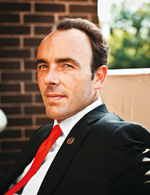 |
| Kyle Bass |
Drugmakers that have been attacked by patent challenger Kyle Bass would like nothing more than to see him stopped in his tracks by the U.S. Patent and Trademark Office (PTO), a move that would also prevent other investment firms from following in his footsteps.
But as the Patent Trial and Appeal Board (PTAB) announced on Friday, it's not going to happen.
The board has denied a request from Celgene ($CELG), one of Bass' targets, to toss out his challenges to its patents, Reuters reports. It dismissed the New Jersey company's argument that if it doesn't stop Bass--who short-sells the shares of the companies he targets, profiting when the patent reviews spook shareholders--other groups will begin to use the review system as an investment strategy, too.
The way the board sees it, short-selling is "legal and regulated," and "profit is at the heart of nearly every patent."
"An economic motive for challenging a patent claim does not itself raise abuse of process issues," it said, as quoted by the news service.
The Biotechnology Industry Organization wasn't happy with the verdict, which it called "cursory and erroneous." The ruling "reinforces the immediate need for Congress and the PTO leadership to take clear and decisive action to prevent any further misuse and abuse of the inter partes review process by hedge funds, extortionists and other questionable entities seeking to undermine it for their own financial benefit," it said in a statement.
Bass raised Celgene's ire back in July, when his Coalition for Affordable Drugs (CFAD) took aim at the patents on thalidomide and related cancer drugs.
Bass and his partners want "to line their own pockets at the expense of public pharmaceutical companies and their shareholders," the company said in legal papers seen by Reuters.
Bass himself has acknowledged that he makes money through the process, but the way he sees it, that doesn't matter. "Celgene accuses CFAD of motives that are not entirely 'altruistic,'" he said in an August filing. "That is a truthful irrelevancy," he claimed, pointing out that shooting holes in "low-quality" pharma patents helps society by bringing down high prices.
Meanwhile, though, while Bass' short-selling is working out just fine, his attempt at overturning patents isn't. A review board has already nixed his challenges to two Acorda Therapeutics ($ACOR) patents on Ampyra and to an IP shield on Biogen's ($BIIB) Tecfidera.
But that hasn't stopped him from pushing ahead with the strategy. Earlier this month, he refiled the two Ampyra challenges with more documentation, and he filed two new challenges against the drug's other patents, too.
"I've spent years of my life working on this and my arguments are as good as can be," Bass told The Wall Street Journal at the time. "I think I can win if they'll just hear the cases on the merits."
- get more from Reuters
Special Report: Top 10 best-selling multiple sclerosis drugs of 2013 - Ampyra - Tecfidera